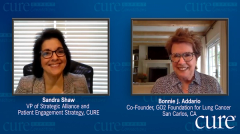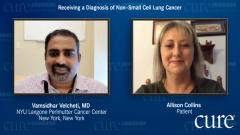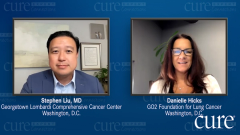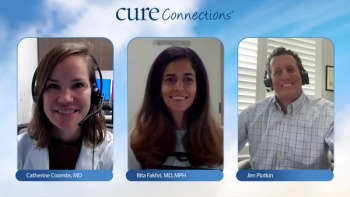
Targeted Therapies in Non-Small Cell Lung Cancer
Thought leaders give an overview on KRAS-mutated non-small cell lung cancer and the treatment options available.
Episodes in this series

Stephen Liu, MD: So, let’s talk a little bit about the advancements in KRAS in non-small cell lung cancer, and the field of target therapies [that] evolved pretty rapidly. KRAS is not a new oncogene. This is something we’ve known about for a long time in terms of biomarkers. I think it was kind of one of the early ones. KRAS goes back to the 1950s, and Harold Varmus, who ran the NCI for a long time, won the Nobel Prize for his role in the discovery here. This is an oncogene that’s not rare. It’s present in maybe around one out of four lung cancers. And when we look at KRAS, we know that this is a transforming event, that this specific change within [a] normal cell will turn a normal lung cell into a lung cancer. Now, this is much more common in adenocarcinoma compared to squamous cancer. There’s some association now with smoking, though that’s a little complex there. The key here—and we talked about this repeatedly in our biomarker discussion—the details matter. You need the granularity because there are many different types of KRAS mutations.
A bit about the nomenclature... The relevant KRAS mutation today is KRAS G12C. And what that means is at position 12 the amino acid glycine, or “G,” is changed into cysteine, or “C.” And so, “G” changes to “C” at position 12, and that turns the normal cell into the lung cancer. And we now have drugs that can really target that specific mutation. But the “C,” that cysteine, that’s important for where the drug binds. It’s important [for] how the drug works. So, we deliver that drug in a G12C mutation, a positive cancer, then that drug is very likely to work, whereas if we deliver [the drug in a] different KRAS mutation, it’s unlikely to work.
For years, our standard treatment for KRAS mutated lung cancer was chemotherapy. More recently, the addition of immunotherapy to chemotherapy in that combination, or immunotherapy alone, has a potential to provide durable, meaningful responses. We’ve been searching for targeted therapy in the treatment of KRAS mutated lung cancer for many decades, and many said it couldn’t be done. And fortunately, we did prove people wrong. And so, what we saw more recently over the past year or so was activity with a drug called sotorasib. And sotorasib is a targeted agent, an oral medication, that is now FDA-approved for the treatment of non-small cell lung cancer that has a KRAS mutation.
But, again, the specific KRAS mutation we’re looking at here is G12C. And not all biomarker testing will tell you which KRAS mutation is present. So, you need to make sure the right testing [is] done. It’s not enough to know that KRAS is there; we need the specific KRAS mutation that’s present. But if we give this agent sotorasib at a dose of 960 mg a day for patients with a KRAS G12C mutation after chemotherapy, we see [a] very impressive response. While the official response rate is 37 percent, the rate of disease control—meaning sort of stability or minor reduction in addition to response—is over 80 percent. And these responses can be quite durable—on average, lasting close to a year. Responses are very quick when we take these drugs; they’re very well tolerated. The first response, on average, will occur usually at about a month and a half.
And so, we now have an approved targeted agent for a specific KRAS mutation. Danielle, this is a mutation that I know many patients you’ve talked to have. What hope does this bring the patients with a KRAS mutant lung cancer?
Danielle Hicks: This has been an incredible sort of breakthrough, in my opinion, and in the opinion of all of those who do harbor this mutation. And I think for a long time... I’ve been working in the lung space since 2004, so a long time, right? And back before we had any drugs to target anything that we even knew about. But as I’ve watched the pie chart, if you will—particularly in non-small cell adenocarcinoma—sort of grow, and these little tiny slices of the pie sort of be identified, be the drugs approved for them... [It] has been an incredible experience. And the KRAS piece of the pie, as you know, is always the largest piece, right?
So, we knew that there was a high propensity for folks with adenocarcinoma to have a KRAS mutation, yet [it is] great we found it. Sorry we don’t have the target right, which I think is very disconcerting for a lot of patients. So, this has been a fantastic, like I said, breakthrough in this space that is going to help a lot of people with this mutation. But I think it points back again—and I’ll keep repeating it because I think it’s so important—[to] the relevance and the importance of this comprehensive testing versus just the single gene sort of test. Because as you just said, you’re not going to find this if you’re just running a simple KRAS test on the tumor.
And I also think the other point I’d really like to make here is the importance of clinical trials. And I’d like to thank all the patients out there who participate in clinical trials because without you, these discoveries simply could not happen. And I know clinical trials still tend to be a sort of terrifying space for patients because they think of their grandfathers’ or their great-grandfathers’ clinical trials, where they were getting insanely toxic drugs and/or a placebo or sugar pill. And they’re like, “Well, I don’t want to risk not getting any treatment and/or getting really sick,” so people weren’t participating, and they really don’t understand that clinical trials have really evolved, and that’s not the case anymore. So, I think a huge, again, “thank you” and shout-out to the folks who make all of what we’re talking about safe.
Stephen Liu, MD: Yeah, the trials and the drugs are so different now from decades ago. This isn’t a drug that we sort of stumbled upon or found. This is a drug that was designed. These [drugs] are designed by medicinal chemists that understand the target; they’re rationally designed. And so, before a drug is approved, for many years, we’ve known about this drug. It had a different name, but we’ve known about this drug. We knew the promise it had. We’ve seen major responses. For a long period of time, the only way to access this drug—which I would consider the best drug for giving a patient—would have been through a clinical trial. So, it’s not necessarily a last resort. In many cases, the best possible treatment that [is] out there may be through a clinical trial.
Transcript edited for clarity.



